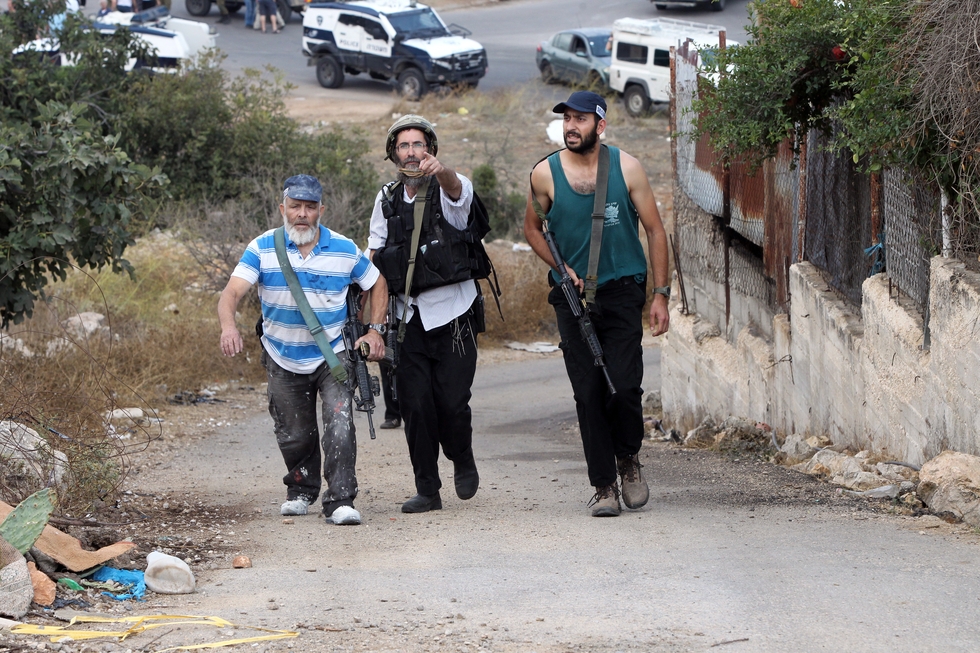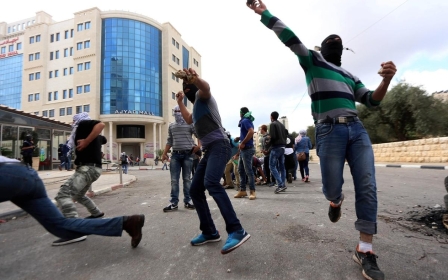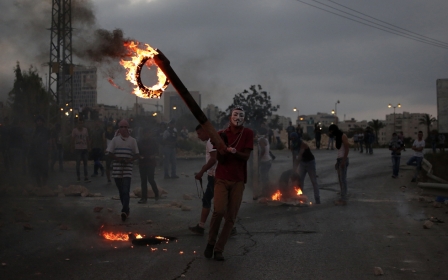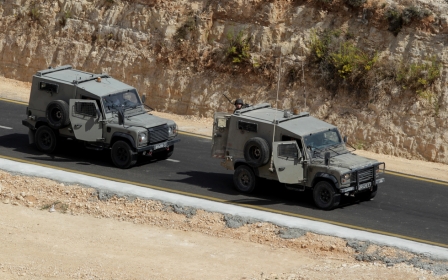Unleashing mob violence in Jerusalem: An act of desperation

The flames rage in the Occupied Palestinian Territory, as thousands of Palestinians are rising up against the Israeli occupation, and a series of violent attacks by individual Palestinians against Israeli civilians, have created a sense of panic among the Israeli public. The efforts of the Israeli military and police to repress the resistance, using brutal methods, only stoke the rage of the Palestinian population further.
In a press conference held on 8 October, Prime Minister Netanyahu and Minister of Defence Ya’alon did very little to reassure the Israeli public. The two merely boasted their confidence that they can defeat the Palestinian uprising by military means: house demolitions, arrests, sniper fire and movement restrictions are more of the same.
The Palestinian police even attacked Palestinian demonstrators in order to help the Israeli forces in crushing the uprising, but Netanyahu nevertheless accused the Palestinian government of “incitement”.
Call to arms
For those looking for incitement to violence, they need to look no further than the Mayor of Jerusalem Nir Barkat, who called on civilians to arm themselves. He meant, of course, only Jewish civilians. Barkat is banking on his heroic image following an event in February this year in which he tackled a Palestinian attacker. The Palestinian stabbed a Jewish man on the street near the municipality. Barkat’s bodyguard aimed his pistol at the attacker and ordered him to put down the knife. The attacker complied and then Barkat and the bodyguard jumped on him to hold him immobile until the police arrived.
After making the call, Barkat was seen in the Palestinian neighbourhood of Beit Hanina with an assault rifle, making one of the neighbourhoods under his responsibility seem like enemy territory.
Israeli society is already a heavily armed society. In 2013 about 160,000 permits were issued for private citizens to carry firearms, and 130,000 for organisations. A study found that during the Second Intifada, civilians intervened in 70 percent of the terror attacks in Israel. A law from 2008 nicknamed the “Dromi law” was passed in the Israeli Knesset after a Jewish farmer, Shai Dromi, open fired shooting two burglars on his territory. The law retroactively recognised the right of civilians to use deadly force even in protection of property.
Last year, the Israeli Minister of Public Security Yitzhak Aharonovitz commented that a terrorist should not come out alive from the scene. It was understood by Israeli police officers that they are to act as executors, killing suspects even if they to surrender or are incapacitated.
That unofficial change in police rules of engagement, coupled with calls by senior officials legitimising civilians taking upon themselves the role of security guards or police, is a dangerous combination. In a single week, 14 Palestinians were killed by Israel’s security forces in protests and violent attacks, most of whom posed no threat or were already neutralised prior to being killed.
Israeli society pays a heavy price for the prevalence of guns and the public discourse which blurs the difference between civilians and combatants. The Knesset approved restrictions on security guards’ access to their weapons in off-hours in an attempt to stop the bout of murders (mostly of women) committed with security guard guns, but regulation was eased again a year later in response to terror attacks.
The mobilisation of the public to take on the role of warriors threatens to escalate the confrontation into a Yugoslavia-style all-out ethnic war. It makes it impossible for the government to control events. Once the gates of legitimate vigilante mob violence have been opened, they are not easy to close again. Indeed, on 9 October, a mob of right-wing Israelis formed to hunt "Arabs" in the streets of Jerusalem and beat them to death. They planned their route to areas where Palestinian cleaning crews would be employed in order to assault them, and asked passers-by for the time, looking for people who answer with an Arab accent. The police was unable or unwilling to cope with the dimensions the mob.
The rules of the game have changed
This mob mentality is not new. Mass arming of the population and mobilisation against the common Arab “enemy” have been commonplace and were among the tools which were used to take over territory, to win wars and build a stable (albeit unequal) political regime. In Israel’s welfare days, the state offered an impressive social safety net for its citizens, and demanded in return prolonged military service and a participation of civilians in the production of security.
Gradually, this reality has changed, and the change has been dramatic. Israel’s economy is neoliberal and the welfare safety net was largely dismantled. The population has withdrawn from military service, and according to the military’s own figures, less than 50 percent of young Israelis enlist in the army, while the majority find various ways to avoid service. Many Israelis are no longer committed to the national narrative as is indicated by the low conscription rate and the low voting rate, to the “fight against the common enemy” mentality, but they are politically silent, and afraid to speak out lest they be branded as traitors.
Even though Israeli politicians reap short-term popularity by encouraging the violent mobs, the usefulness of this strategy today is not what it used to be before the 1990s. Israel today is a globalised economy, heavily dependent on tourism, exports and imports and on its good relations with the US and Europe. In the age of mass media and citizen journalists, videos showing the lynching of Palestinians cannot be censored nor silenced, and they affect the world’s public opinion on Israel.
The reliance on vigilantes also directly undermines the monopoly of Israel’s security organisations. When Palestinians are executed on the street with a nod from the political elite, it makes Israel’s legal institutions superfluous and discredited. When all the security cameras in the Old City of Jerusalem cannot prevent the next attack, it discredits Israel’s security exports. When the Wall of Separation fails to prevent attackers from reaching their targets, it is exposed as a tool of segregation rather than of security.
Whether the current Palestinian uprising and Israeli repression will continue to escalate or not, this confrontation shows the limits of Israeli power. Superior weapons and the ability to take lives is no longer enough to keep the Palestinians meek and submissive, and Israel has very few mechanisms to deal with a non-violent, popular uprising.
- Shir Hever is a graduate student at the Free University of Berlin, and an economist with the Alternative Information Centre.
The views expressed in this article belong to the author and do not necessarily reflect the editorial policy of Middle East Eye.
Photo: Armed Israeli settlers walk up a road at the site of a reported stabbing attack by a Palestinian on an Israeli settler, near the Israeli settlement of Kiryat Arba, near Hebron in the occupied West Bank on 9 October , 2015.
New MEE newsletter: Jerusalem Dispatch
Sign up to get the latest insights and analysis on Israel-Palestine, alongside Turkey Unpacked and other MEE newsletters
Middle East Eye delivers independent and unrivalled coverage and analysis of the Middle East, North Africa and beyond. To learn more about republishing this content and the associated fees, please fill out this form. More about MEE can be found here.





